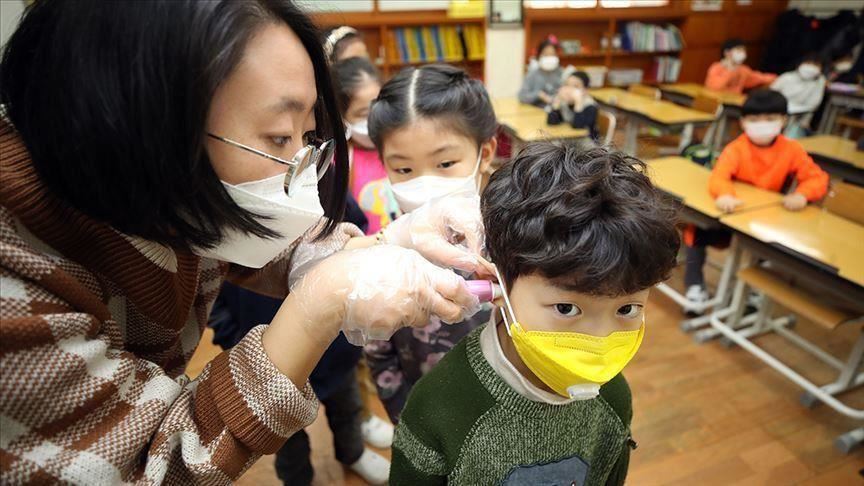‘COVID-19 risks kids’ health, development, protection’
Disruption in children routine activities in families, friends, society causes problems, according to sociology professor

ANKARA
The novel coronavirus pandemic poses negative effects on children’s health, development and protection because of the disruption of routine activities of families, friends and society, according to a sociology professor.
Ahmed Zayed, who teaches sociology at Cairo University in Egypt administered a workshop on media interaction with implications for children’s rights in light of the coronavirus crisis.
The workshop was organized Wednesday by the Union of News Agencies (UNA) in cooperation with the Arab Council for Childhood and Development (ACCD).
Zayed said the pandemic caused a state of anxiety from being infected with the virus or loss of work and those psychological effects can be transmitted to children. It also disrupted daily routines for children and caused emotional and psychological distress with the loss of a loved one, illness or separation or fear of the disease.
The quarantine and isolation measures have created fear and panic and increased levels of tension in the community, especially among children, according to Zayed, who cautioned it caused an increase in abuse and domestic violence against children, and increased risk of sexual exploitation of children, including sex for assistance and forced early marriage. He warned prolonged home confinement may increase the possibility of children’s exposure to physical and psychological violence.
The lecturer spoke about educational effects, particularly losing organized schooling after the right to education for more than 1.6 billion children worldwide has been disrupted as 190 countries imposed school closures. He pointed to a gap in the home academic achievement versus school achievement, and the loss of touch with a teacher.
The workshop addressed the effects of the COVID-19 crisis on children's rights. Preoccupation with fears may lead to shifting public responsibility for children to other concerns, as the exceptional and unprecedented conditions caused by the pandemic have compounded the vulnerability of some groups of children, including children with disabilities, those living in poverty, children living on the streets, refugees and children with pre-existing health conditions.
Zayed stressed the importance of providing school activities that educate children on how to face problems; designing movies and electronic games to teach children about facing danger and positive physical and psychological self-management and providing alternative and innovative solutions for children to enjoy their rights to rest, leisure, entertainment, and cultural and artistic activities, which is essential for health, well-being, development of creativity, imagination and self-confidence.
He emphasized the importance of identifying flexible strategies to communicate with communities remotely, to promote safe coping mechanisms; and working with traditional and religious leaders and media professionals to adapt traditional practices to post-pandemic future situations.
The lecturer called for developing a post-pandemic recovery plan; working in a spirit of cooperation with children and adolescents to help bridge generational gaps and contribute to strengthening solidarity between different age groups; disseminating child-friendly social messages about risks and vulnerabilities children face during an outbreak; and creating online sessions and support groups to enable people to interact positively.
He presented three scenarios for the situation of children in the post-coronavirus crisis, including paying more attention to children and child-related international conventions; more attention to children in special circumstances, including wars, refugees, displacement, detention, violence and forced exploitation, migrants and hazardous occupations; and more attention to the family, as well as to domestic and international conventions on supporting families in times of danger and exceptional circumstances.
Solidarity among governments against virus
ACCD Secretary General Dr. Hassan El-Bilawi mentioned the workshop comes in continuation of ACCD's efforts and initiatives to tackle the risks and challenges presented by the coronavirus, saying it was imperative the Council to engage in the protection of children, families and the destitute.
He explained ACCD's efforts include the launch of an awareness campaign on social media and in cooperation with the United Nations High Commissioner for Refugees (UNHCR) to support refugee children, in addition to cooperation with the United Nations Children's Fund (UNICEF), and the Arab Scout Organization.
El-Bilawi called for tackling COVID-19 effects in solidarity and cooperation between governments, civil society organizations and the private sector, while looking to the future, in which we amend behaviors and modalities of life to develop ways for children's care and protection, as well as working to establish social protection policies, and to transform policies into legislation, laws and culture for a decent life for children, women and marginalized people.
The workshop – held in partnership with the Organization of Islamic Cooperation (OIC) and the Islamic Broadcasting Union (IBU) – benefited 250 media professionals from news agencies, radio stations, TV channels, newspapers and electronic platforms, from 40 OIC member states as well as those from Muslim minorities in non-member countries.
Anadolu Agency website contains only a portion of the news stories offered to subscribers in the AA News Broadcasting System (HAS), and in summarized form. Please contact us for subscription options.

